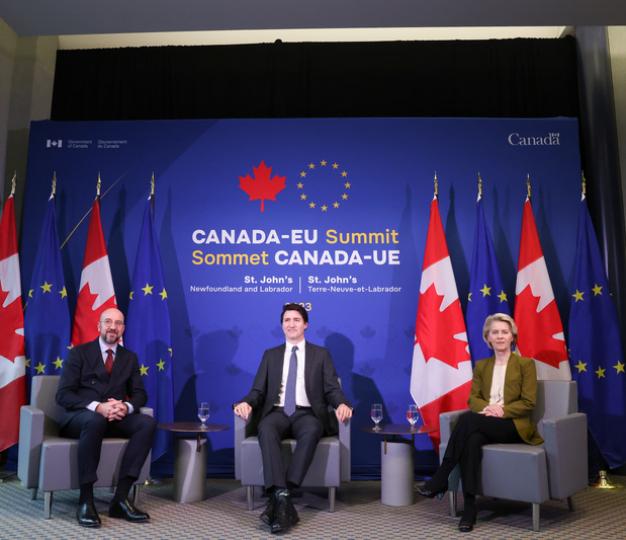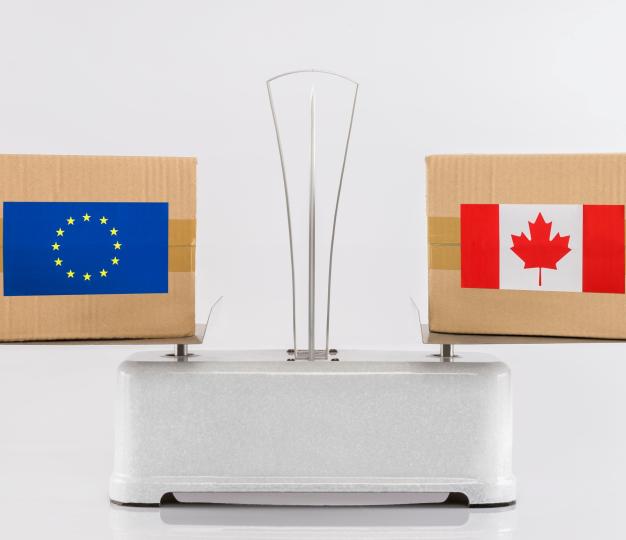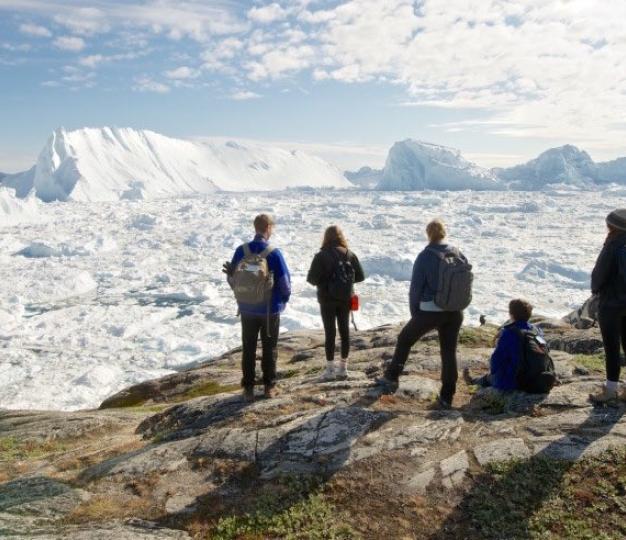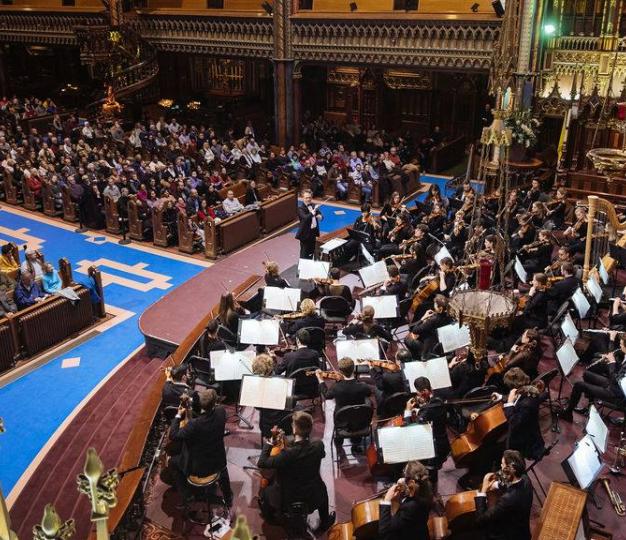RELATIONS WITH THE EU
The European Union and Canada
Canada and the EU share the same goals, values and a common world view. As one of EU's global strategic partners, Canada works closely with the EU towards further deepening effective, mutually-beneficial political and economic cooperation.
Political Relations
The EU and Canada enjoy a vibrant strategic partnership built on effective multilateralism, a progressive international policy agenda and inclusive trade. New political opportunities under the Strategic Partnership Agreement (SPA) and new trade opportunities under the Comprehensive Economic and Trade Agreement (CETA) have brought Canada and the EU closer than ever, a close friendship and a reliable partnership further enhanced by the current geopolitical environment.
Strengthening strategic cooperation
The framework for the EU-Canada relationship is set out in the Strategic Partnership Agreement (SPA), an update of the 1976 Framework Agreement for Commercial and Economic Cooperation. SPA reflects recent global developments and provides a platform for advancing Canada-EU foreign policy goals, as well as joint international action. It reinforces cooperation in strategic areas such as:
- International peace and security.
- Human rights.
- Environmental protection.
- Research.
- Innovation.
- Energy security.
- Education.
Working together on issues of shared interest and responsibility, the EU and Canada hold regular consultations, including summits between the Canadian prime minister and the presidents of the European Council and the European Commission, ministerial consultations and dialogues of the political directors. What’s more, there are ongoing specific consultations on regional and global issues ranging from energy, environment and climate change to non-proliferation, defence and security matters.
Canada also participates in the EU’s civilian missions and military operations under the Common Security and Defence Policy (CSDP), for example in the Balkans, Ukraine and the Middle East. In addition, Canada and the EU regularly join forces on electoral observation missions.
Economic and Trade relations
A strong supporter of free trade, Canada has always been a natural ally for the EU. In 2020, Canada was the EU's 10th most important trading partner, accounting for 1.5% of the total external trade. In turn, as Canada's third most important trading partner, the EU accounted for 8.2% of Canada's total external trade and the total value of the two-way trade between the EU and Canada was €53.3 billion for goods (2020) and €25.6 billion for services (2020). For more information on EU-Canada trade, for more details.
CETA
The EU-Canada Comprehensive Economic and Trade Agreement (CETA) guarantees the future of supply chains and the economic recovery in the wake of the pandemic, placing Canada and the EU in a stronger position to weather the economic downturn and better navigate recovery. The EU and Canada will continue to build on momentum and maintain open economies, while highlighting the importance of supply chains: advancing the implementation of CETA is essential to the post-COVID economic recovery on both sides of the Atlantic.
CETA is not just one of the most ambitious trade agreements the EU has ever concluded, but also the most progressive. CETA goes beyond just removing customs duties and contains ambitious chapters on sustainable development, labour and the environment. It offers significant benefits for the economies, businesses and consumers in both Canada and the EU.
CETA has been applied provisionally since 21 September 2017. A provisional application allows for a meaningful application of the substance of the agreement right from the start. Some areas, such as the provisions related to investment protection and the investor-state dispute settlement mechanism (Chapter VIII) have yet to be approved by all the national parliaments of the EU Member States before full entry into force. Member States that have ratified CETA so far include Czech Republic, Denmark, Estonia, Spain, Croatia, Latvia, Lithuania, Luxembourg, Malta, Austria, Portugal, Romania, Slovakia, Finland and Sweden.
Companies are taking advantage of the new and easier trading opportunities. In 2020, the overall EU exports to Canada (goods and services) totaled €49 billion and its overall imports reached €32 billion.
Compared to 2016, the last full year before CETA entered into force, total trade flows between the EU and Canada saw an increase of 15.3% for goods in 2020 despite the pandemic. Similarly, trade in agricultural goods increased by 34.7% in 2020 compared to 2016.
What's more in 2021, EU-Canada trade in goods reached an all-time high of €60.7 billion. It represents an increase of 31% compared to before CETA entered into force in 2016.
These positive trends highlight the importance of CETA as a bedrock of our relationship with Canada.
Links:
A number of practical resources have been developed for companies seeking to better understand the concrete advantages of CETA. For an updated list please click here
If you have any questions regarding trade promotion, please contact trade representatives of EU Member States directly.
Access2Markets is your one-stop shop for information on requirements for exporting to the EU.
Watch success story testimonials:
https://eeas.europa.eu/delegations/canada/85524/spotlight-ceta-success-stories-toronto_en
https://eeas.europa.eu/delegations/canada/85521/spotlight-ceta-success-stories-vancouver_en
Environment and Climate
COVID-19 is an exceptionally large-scale human tragedy. Science tells us that this is just a warning compared to the existential risks for our civilization associated with global warming, the loss of biodiversity (including in the oceans) and other global challenges in the years to come.
The EU and Canada share the objective of net-zero greenhouse gas (GHG) emissions by 2050. To this end, the EU and Canada are calling on countries to increase their targets of GHG emission reductions ahead of the 26th UN Climate Change Conference of the Parties (COP26) in Glasgow in November 2021. The EU and Canada are already working in sync to achieve these shared objectives through robust post-COVID green recovery packages and regular bilateral High-Level Dialogues on Climate, Energy, Environment, and Oceans. In multilateral fora, EU and Canada are also working in tandem – for instance through joint multilateral initiatives, such as the Ministerial on Climate Action (MoCA), the Conference of the Parties to the UN Convention on Biological Diversity, and the International Conference on Chemicals Management.
The development of clean technologies, sustainable energy sources, including hydrogen or wind and wave power, and the reduction of pollution via carbon capture or recycling are at the core of our joint efforts.
Ensuring the security of supply chains for the minerals and metals critical to the transition to a climate-neutral and digital economy is a priority for both Canada and the EU. This is why they have agreed to establish a Canada-EU Strategic Partnership on Raw Materials (Strategic Partnership) within the mandate of the CETA, with a focus on the integration, resilience and competitiveness of Canada-EU raw material value chains; science, technology and innovation collaboration; and environmental, social, and governance (ESG) criteria and standards.
Promoting Human Rights and Democracy
The European Union and Canada share values of freedom, democracy, diversity, inclusion and human rights. Together, we are committed to upholding democratic principles and human rights, to advancing democracy, including free and fair elections, and the importance of the rule of law for effective governance. The Strategic Partnership Agreement offers a solid framework for this cooperation with well-established and regular high-level dialogues on human rights and on security and defence, as well as cooperation at the UN level and within other multilateral fora.
At the June 2021 Summit in Brussels, EU and Canadian leaders reaffirmed their engagement to step up the promotion of international peace and security, protection of human rights, gender equality, liberal democracy and the rule of law, and respect for international law. In the face of growing threats to democracies, these efforts include advancing cooperation in the framework of the G7 Rapid Response Mechanism to tackle foreign interference and disinformation, as well as on sanctions, including on human rights, and cooperation in line with the Declaration Against Arbitrary Detention in State-to-State Relations.
Arctic Relations
EU countries Finland, Sweden and Denmark (via Greenland) all have Arctic territories and are members of the Arctic Council, alongside Canada. The EU itself enjoys the rights of an active observer at the Arctic Council. This enables the EU to better understand and address concerns of Arctic partners while developing the EU Arctic Policy in close cooperation between the European Commission, the European Parliament and EU Member States.
As a leading forum for Arctic cooperation, an important element of the Council is the inclusion of the Arctic Indigenous peoples with special ‘Permanent Participants’ status.
The EU and Canada are already cooperating on Arctic issues, such as marine science research under the Horizon Europe programme.
Another area for cooperation concerns the conservation of fish stocks. Canada and the EU agree in principle on the need for a science-based, precautionary approach, in line with national and international law, notably the UN Convention on the Law of the Sea.
Public Diplomacy
The Delegation of the EU to Canada, in close cooperation with the diplomatic missions of EU Member States, promotes European culture year-round through a number of well-established public diplomacy activities, and special events, such as the Frenergy Tour – the four-city joint collaboration between the European Union Youth Orchestra and the National Youth Orchestra of Canada in 2019. These events have successfully contributed to enhancing the knowledge and understanding of the EU and its relations with Canada.
Europe Day
Each 9 May Europe Day celebrates peace and unity in Europe as it marks the anniversary of the historic 1950 Schuman Declaration, which set out a vision for a new form of European political cooperation that would make war between European nations unthinkable. Europe Day is celebrated in Ottawa and in other major Canadian cities.
European Day of Languages
The European Day of Languages is celebrated on 26 September each year. The Delegation, together with the diplomatic mission of EU Member States and local public school boards, organises mini-language classes and country-specific booth displays in Ottawa, among other activities.
European Union Film Festival
Every year, the European Union Film Festival (EUFF) gives Canadians from coast to coast — including Vancouver, Toronto and Ottawa — a chance to experience Europe's diverse and rich film heritage.
Whether highlighting historic events, political subjects or personal dilemmas, European films are intellectually stimulating and culturally engaging.
The festival runs for two weeks in late November/early December. It is organised by the Delegation, the Diplomatic Missions and cultural institutes of EU Member States in cooperation with Canadian film industry partners.
European Union Christmas Concert
Since 2008, the Delegation, together with the diplomatic missions of EU Member States and local school choirs, has organised a Christmas concert showcasing the very best of European Christmas carols. The event, held at Notre-Dame Cathedral Basilica in Ottawa, has become a Christmas tradition that drew more than 1,500 people in pre-pandemic times.
COVID-19 Response
The pandemic has certainly exposed the fragility of the global system - and has highlighted the need to step up a coordinated international response. The EU and Canada have been leading by example as champions of multilateral coordination, in full solidarity with our most vulnerable partners. Together, we managed to keep vital supply chains open, support the World Health Organization (WHO), lead international efforts to develop COVID-19 vaccines and treatments – and, through the COVAX global initiative, help ensure that safe vaccines are available for everyone who wants them. The only way we can ensure a full global recovery is through international collaboration and coordination.
The EU also played a vital role in ensuring a consistent and steady stream of vaccine supplies to Canada. In the early stages of the vaccination rollouts, most of the vaccines distributed in Canada came from EU-based plants.




